solstice kitchens
after Les Misérables by Victor Hugo and Being and Nothingness by Jean-Paul Sartre; the recipe (or lack thereof) as a prompt
‘Table talk and Lovers' talk equally elude the grasp; Lovers' talk is clouds, table talk is smoke.’
– Les Misérables by Victor Hugo (Volume I, Book III, Chapter VI)
A KITCHEN IN WHICH THEY ADORE EACH OTHER
The crispy skin of a frying egg. A light, burnt aftertaste after I caught its runny yolk whole, mopping leftover with bread crust. Nothing new under the sun.
Salt melts at the tip of my tongue
pick peaches young and sour before summer begins; watch-out for the wasps, bake a tart to share with friends.
And basil as it colours my fingertips, green and sticky, as if I had been sitting on grass. Petting it after the snails had done their business, slimy natural things, oh so wild before I cooked them. Ragù preserves well – warm on polenta, cold on toast.
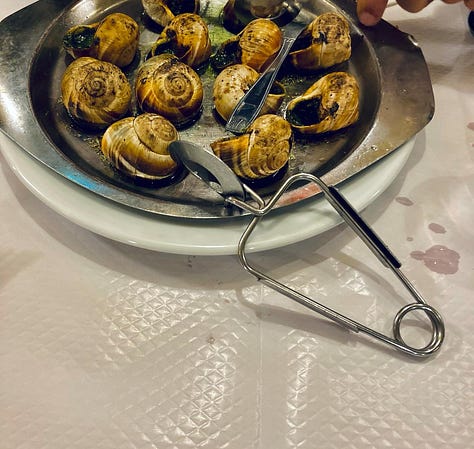
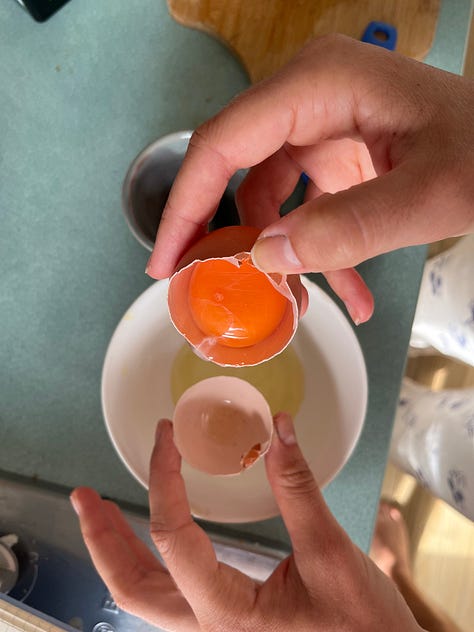

A KITCHEN IN WHICH NOTHINGNESS CARRIES BEING IN ITS HEART
Biased ways to eat a melon: Cantaloupe is halved, left in its shell, a fizz to scoop; cubed watermelon, served with mint and feta in a salad bowl; peeled, crushed, frozen, in a sorbet; honeydew is cut in squares, pistachio nuts crushed on top, a few drops of almond milk for cushion.
Plain yoghurt, sliced banana, chopped dates, too sweet; pistachios, shell off, better.
The paprika is sweet too, soothing the tomato sauce. Plenty of olives, garlic, capers, sage; simmer simmer simmer but keep the heat low, exhale. Tomatoes are nicknamed ‘pommes d’amour’ in French.
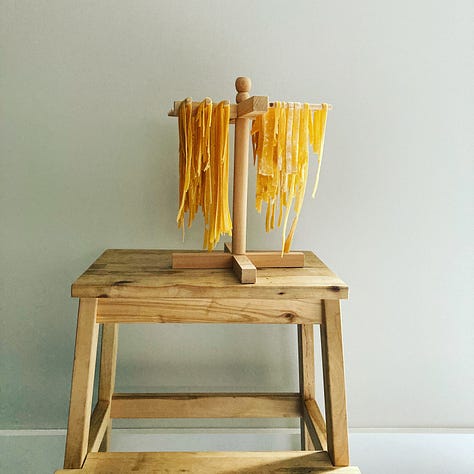

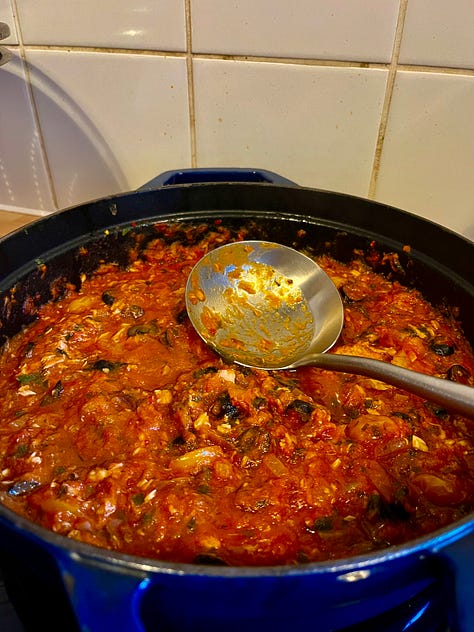
A KITCHEN IN WHICH THEY CURE ONE ANOTHER
Not one bland dish in a kitchen where good oil can be found.
Sardines in a tin, mashed with the help of a fork, one spoon of miso paste, the juice of half a lemon; mix. Spread on toast, a sprinkle of oregano on top. Always keep the oil from the can for future vinaigrettes.
Sliced tomatoes dress in oil and rock sea salt. Eat. Pick the tomato seeds with bread. Another meal completes.
A gulp of oat cream in the courgette orzo is always a good idea.
And might I suggest easing bone spurs and other stiffness with a pastry dough? It rolls under the palm of the hand, butter cubes sweating at skin contact, loosening, melting. A pinch of semolina, white flour and a dash of cold water; some salt, too. Kneading, rolling and plenty of dill, beetroots, feta cheese and nigella seeds for the topping.
As the fever faints, frazzled stomach and syrupy feet, the peanut butter must be crunchy. Spread on a plain bagel, lightly toasted.
Until next time, a nostalgic snack: crusty baguette, Balena anchovy paste, ricotta cheese and a sprinkle of oregano from Pantelleria; make a wish, lick your lips for a second round of luck, salty.
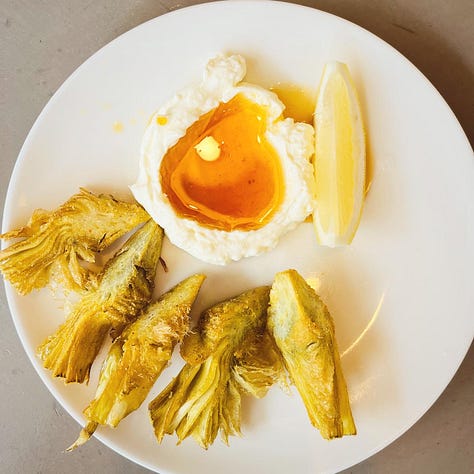
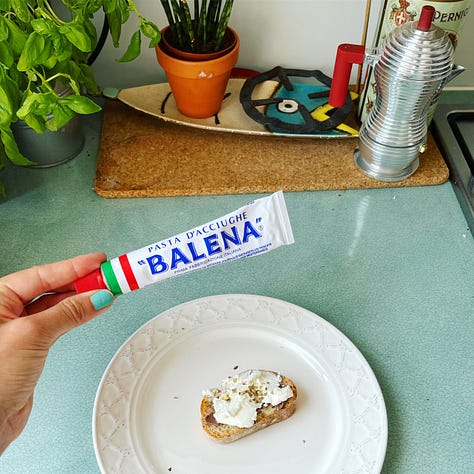

‘From the very fact, indeed, that I am conscious of the motives which solicit my action, these motives are already transcendent objects from my consciousness, they are outside; in vain shall I seek to cling to them: I escape from them through my very existence. I am condemned to exist forever beyond my essence, beyond the affective and rational motives of my act: I am condemned to be free.’
– Being and Nothingness by Jean-Paul Sartre
And, still in Being and Nothingness, Sartre adds, ‘freedom is what we do with what is done to us.’
A KITCHEN IN WHICH THEY SET FREE
Sliced apples, dipped in coffee.
Glossy pesto spaghetti twirls in the mouth before another cloudburst. Semolina and a pinch of lukewarm water for the dough; basil, cashew nuts, parmesan and plenty of olive oil for the pesto.
A nutty oyster must be loosened from its shell, then swallowed;
a drenched olive inside an empty Martini glass should be gulped.
It is a fine thing to be asking what’s for dinner as you eat your lunch.
Flour, yolk, yolk, yolk and one full egg for the dough. Knead. Half red onion, one celery stick, a bruised tomato, two carrots, a bunch of parsley, the bones and the head of a red mullet for the broth. Bring everything to a boil in a large casserole, then lower the heat to minimum—cover, simmer. Pasta sheets, cut lengthwise, spider crab meat filling; shape the pasta into anolini. Filter the broth, return it to a jaunty simmer and cook the pasta until they will float back to the surface. The wind blows.
Tahini biscuits, coated with pistachio nuts and black sesame seeds; oh oui, Sunday morning heals.

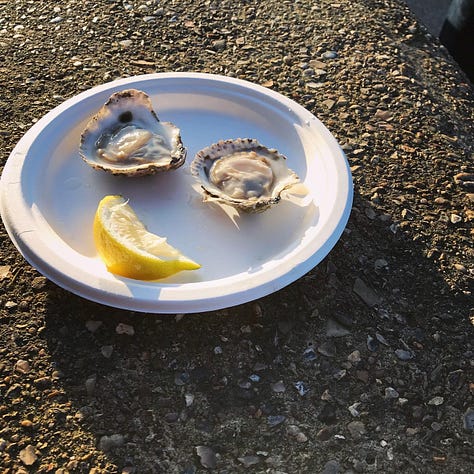



A KITCHEN IN WHICH SUMMER BEGINS
Summer solstice fish in acqua pazza: garlic, parsley and one red chilli, all thinly chopped; olive oil, a generous gulp; fish of your choice, filleted (or whole, if pan dimensions allow); cherry tomatoes, roughly chopped; a low simmer, patience, today will be the longest day of the year.
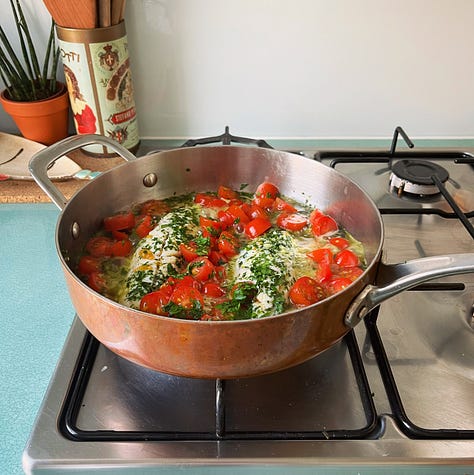
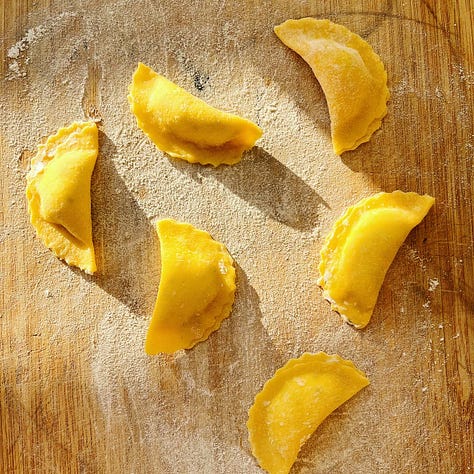
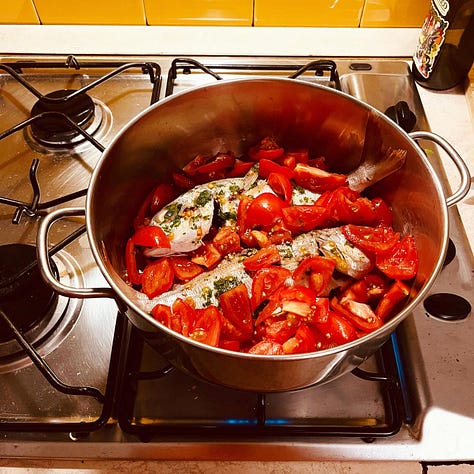
On Saturday 21st June 2025, at 3:42 am BST, the sun will reach its highest point in the sky above the northern hemisphere and the longest days of the year will occur, before daylight will recede again. The moon will be new on the 25th day of June. About the crescent moon, Jean-Paul Sartre had said that it was crescent only by contrast to a full moon which is not. Lacking what would make the moon full is part of what a crescent moon is.
If the sun sets, it will have risen indeed. Share photos of the sky, pals.
margaux
*I owe the first heading of this newsletter to the ‘chapter in which they adore each other’ from Les Misérables by Victor Hugo, from which the first quote in exergue is extracted. The second heading was inspired by Jean-Paul Sartre’s Being and Nothingness.
thank you for reading The Onion Papers. i’m margaux, a writer and cook, and this is my hybrid newsletter. if you enjoy my work, remember to subscribe and/or invite friends to the party as you keep me going.
PS. I write novels too.
the recipe as a prescription: for hope
The etymology of the word “recipe” tracks back to the 1580s: ‘medical prescription, a formula for the composing of a remedy written by a physician,’ from the French “récipé” (15c.), from the Latin “recipe” – meaning take! (this or that ingredient) – from the second person imperative singular of “recipere”, so ‘to hold, contain’. Since its origin, the in…




